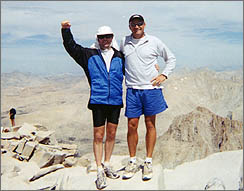|

Hiking to the Top of Mount Whitney
All in a Day’s Work for Profs
From Dateline (October 23, 2003)
 |
| Scott Hewitt, left, and Phil Armstrong
have found a new way to release frustration: run and power-walk
to the top of a mountain – in this case, Mount Whitney.
Armstrong, assistant professor of geological sciences,
completed the late summer journey in 3 hours, 45 minutes,
while Hewitt, professor of chemistry and biochemistry,
followed 20 minutes later. |
|
 |
Some people run to the corner store. Others
jog in a park or run around a school track.
Scott Hewitt and Phil Armstrong are serious runners.
This summer they ran and power-walked to the top of Mount Whitney,
the highest mountain in the continental United States.
Hewitt, professor of chemistry and biochemistry,
and Armstrong, assistant professor of geological sciences, rose
early on a Friday morning in August and left Fullerton (elevation
155 feet) at 2 a.m. They headed for Lone Pine and the trailhead
at Whitney Portal (elevation 8,360 feet), the starting point for
a hike up Mount Whitney.
At 6:30 a.m., the adventure began. It’s 11
miles to the 14,491-foot top on the popular trail, but the altitude
gain of 6,000 feet in those 11 miles takes its toll on hikers.
Hewitt, 40, and Armstrong, 43, ran the parts of the
trail that were flat or sloped slightly uphill. For the steep parts
– the majority of the trail – they power-walked, carrying
100 ounces of fluids, an extra shirt/jacket, food, some minor first
aid items and a camera.
“We passed many hikers on the way to the top,”
said Hewitt. “Most had heavy packs and were planning on reaching
the top in two or three days.”
They reached the six-mile mark, a 3,500-foot vertical
gain, in 2 hours, 5 minutes. At that point the duo felt they could
reach their goal of making it to the top in four hours.
The rest of the way, however, was grueling.
“The top half was very difficult due to the
lack of oxygen from the high elevation. Both of us had periods of
dizziness, not being able to get enough air into our lungs, with
muscles burning and fatiguing,” Hewitt said. “Consequently,
we were forced to slow down.”
Armstrong, who has competed in four 100-mile races
and a dozen 50-mile contests, was able to maintain a faster pace,
reaching the top in 3 hours, 45 minutes. Hewitt, who ran his first
32-mile race last spring, arrived 20 minutes later. After a rest
at the summit, the duo ran most of the way downhill to the trailhead.
“Our goal was to establish a ‘world record’
time from CSUF to the top of Whitney and back,” said Armstrong.
“I think we set that record now at 17 hours. We could have
‘easily’ cut an hour or two off of that time by not
lollygagging on the top for 45 minutes, pushing harder on the bottom
half, driving faster and not stopping for a milkshake on the way
home.”
The pair train by running twice a week, including
weekend running in the mountains.
“We prefer the mountains for the challenge,
to prevent injuries (softer running surfaces which help avoid repetitive
motion injuries) and for the beauty and peacefulness,” said
Hewitt.
Hewitt and Armstrong’s next challenge might
be an attempt to do the three tallest peaks in Southern California
in one day – Mount Baldy, Mount San Gorgonio and Mount San
Jacinto. This would involve up to 14,000-feet elevation gains and
35 to 40 miles of trails, depending on courses. They also plan to
do several mountain ultras, races that are longer than a marathon,
usually 31 to 100 miles.
« back to People
|